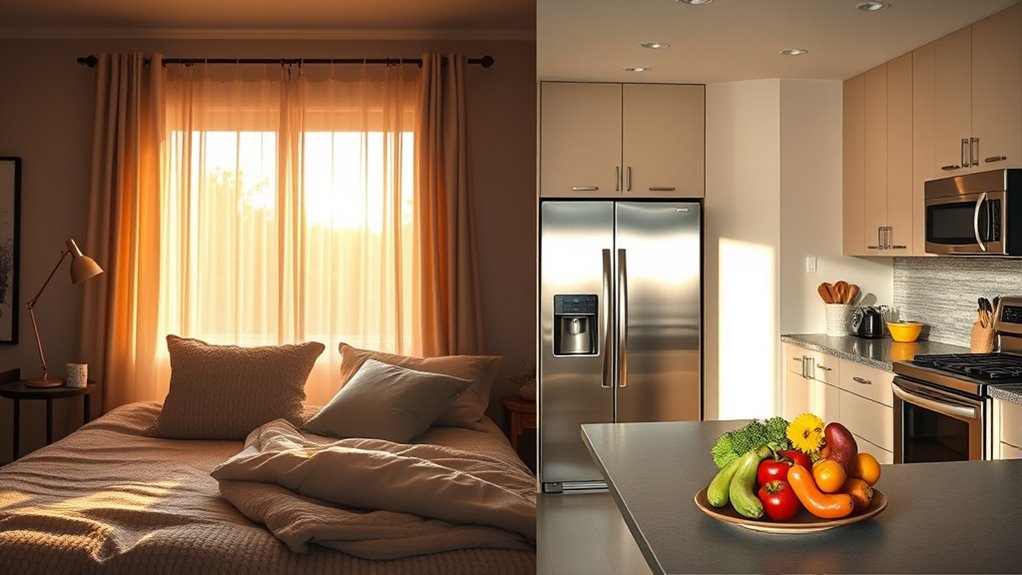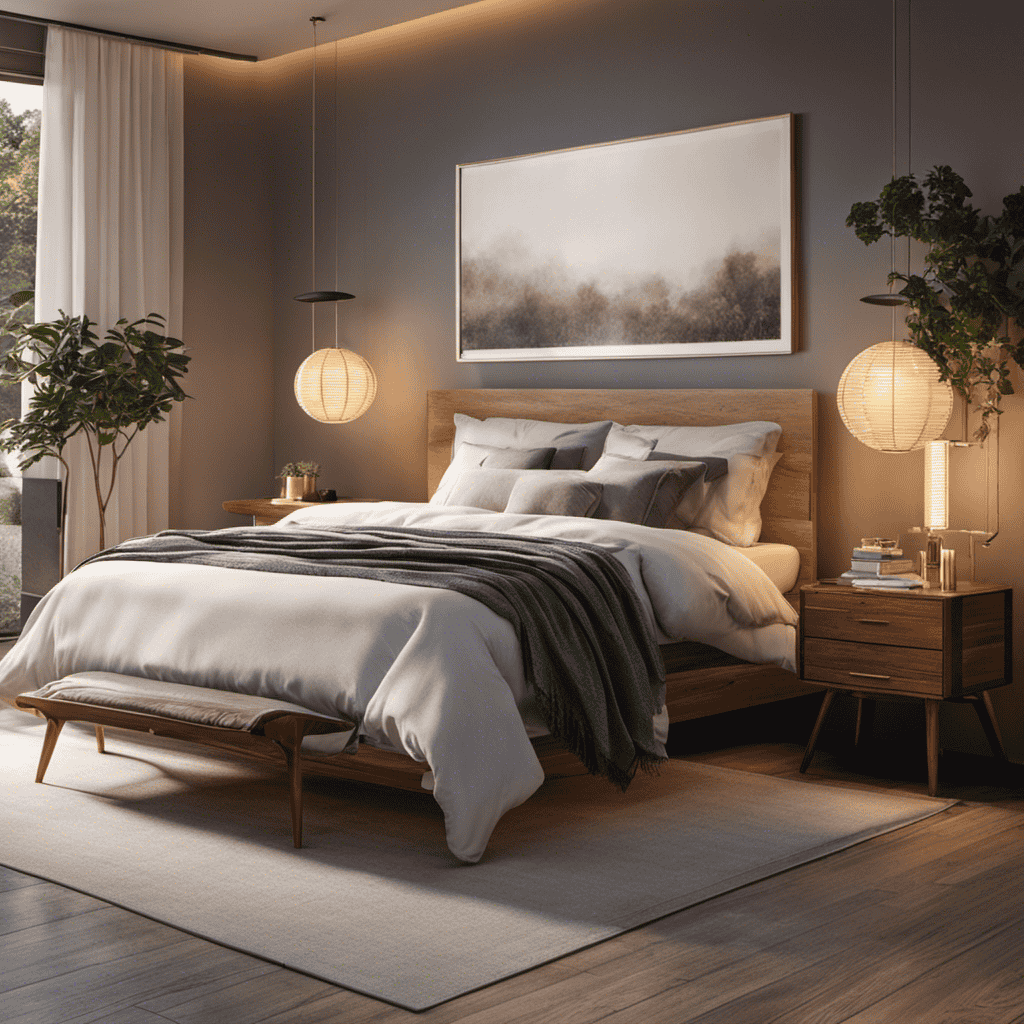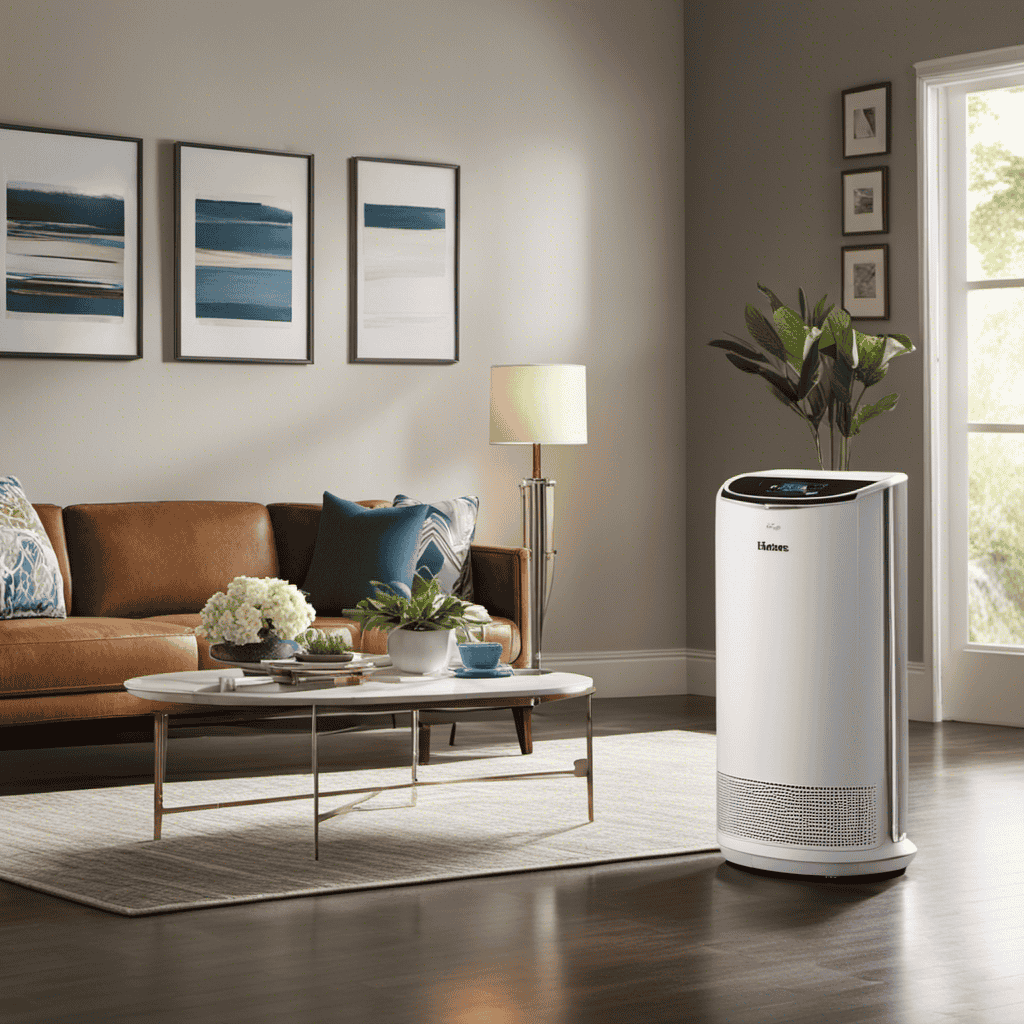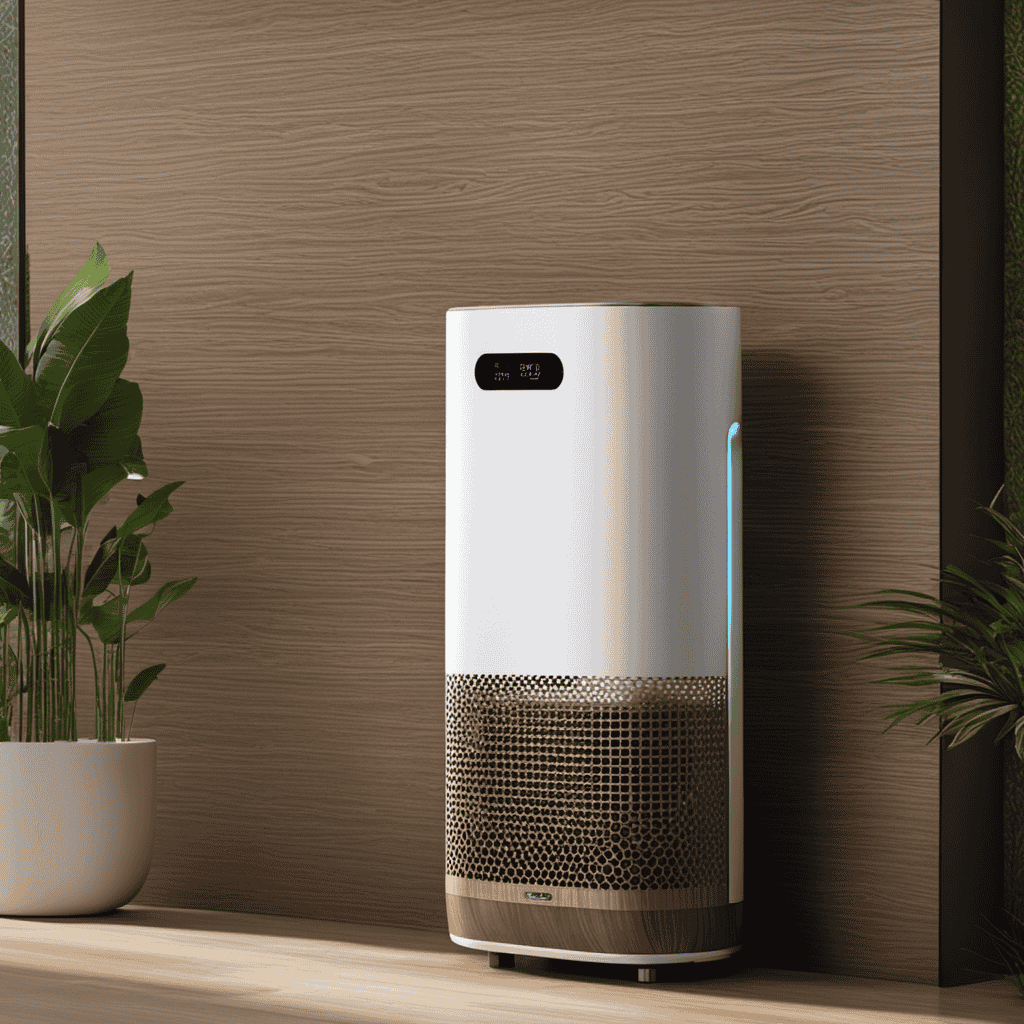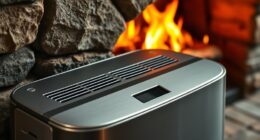Your bedroom and kitchen face different airborne challenges, so they need specialized filters. In the bedroom, a HEPA filter helps trap allergens, dust, and pet dander, promoting better sleep and health. In the kitchen, activated charcoal filters absorb cooking odors, VOCs, and grease particles. Using the right filter for each space guarantees ideal air quality and comfort. Keep going to discover how to choose and maintain the best filters for every room in your home.
Key Takeaways
- Bedrooms require HEPA filters to remove allergens and dust, promoting better sleep and allergy relief.
- Kitchens produce cooking fumes and grease particles, necessitating activated carbon filters to absorb odors and VOCs.
- Quiet, energy-efficient filters are essential in bedrooms to prevent sleep disturbances and support continuous use.
- Kitchen filters must handle higher humidity and grease, which can clog standard filters faster.
- Different room-specific contaminants demand tailored filtration technologies for optimal air quality and health.

Air quality in your home directly impacts your health and comfort, especially in spaces where you spend a lot of time, like bedrooms and kitchens. Each room has unique needs when it comes to air filtration, so using a single filter type for both might not deliver the best results. Your bedroom is a place for rest and relaxation, so you want an air purifier that minimizes allergens, dust, and pet dander without creating excess noise or disrupting your sleep. Conversely, your kitchen tends to produce cooking fumes, grease particles, and higher humidity levels, requiring a different approach to filtration.
The air purifier benefits in your bedroom come from filters designed to target fine particles and allergens. HEPA filters are particularly effective at trapping pollen, dust mites, pet dander, and other airborne irritants. These filters guarantee you breathe cleaner air, helping reduce allergy symptoms and promoting better sleep. When choosing a filter for your bedroom, look for one with a low noise level and energy efficiency, so it doesn’t interfere with your rest.
In the kitchen, however, your air needs are different. Cooking produces smoke, grease, and strong odors that can linger and settle on surfaces. A filter with activated carbon or charcoal is essential here because it absorbs odors and volatile organic compounds (VOCs). This prevents the smell from spreading and keeps your kitchen smelling fresh. Additionally, high-quality filters that can handle grease particles and larger contaminants will extend the life of your air purifier and maintain effective air cleaning.
Proper filter maintenance tips are vital regardless of the room. Regularly replacing or cleaning your filters ensures they perform at their best and prolongs the device’s lifespan. Check the manufacturer’s instructions for recommended replacement intervals—usually every 6 to 12 months for HEPA filters and more frequently for activated carbon filters in kitchens. Keep an eye on filter indicators if your device has them, and don’t ignore the signs of clogging or reduced airflow. Cleaning pre-filters monthly can help catch larger particles before they clog the main filter, saving you money and maintaining efficient operation. Incorporating advanced automation features can help monitor filter status and optimize maintenance schedules, ensuring consistent air quality.
Frequently Asked Questions
Can I Use the Same Filter Type for Both Rooms?
You might wonder if you can use the same filter type for both rooms. While it’s possible, it’s not always ideal because air quality needs differ. Filters designed for kitchens may not provide the same level of allergen or odor removal needed in bedrooms. Always check filter compatibility with your appliances and consider room-specific air quality needs to guarantee you get the best air purification for each space.
How Often Should I Change Bedroom vs. Kitchen Filters?
Many believe you can change filters on the same schedule everywhere, but that’s not true. Your bedroom filter typically needs replacement every 90 days, while the kitchen filter’s lifespan is shorter, around 30-60 days, due to cooking fumes and grease. Follow maintenance tips like checking filters monthly, and replace them promptly to guarantee ideal air quality. This way, you protect your health and keep your HVAC system running smoothly.
Do Different Filters Remove Specific Allergens Better?
Yes, different filters are better at removing specific airborne allergens. For example, HEPA filters use dense filter material that captures tiny particles like pollen, pet dander, and mold spores more effectively. If you’re targeting particular allergens, choose a filter designed for that purpose. You should select a filter with the right material to guarantee it effectively traps the airborne allergens present in your environment.
Are High-Efficiency Filters Necessary for Bedrooms?
Imagine your bedroom as a sanctuary — now, do you really want to guarantee on air quality? High-efficiency filters aren’t always necessary, but they do improve filter efficiency and remove small particles, dust, and allergens better. If you suffer from allergies or asthma, investing in a top-tier filter helps assure cleaner air while you sleep. For most, a good quality filter strikes the right balance, maintaining comfort and health.
How Do I Know if My Filter Is Effectively Cleaning the Air?
You can tell if your filter is effectively cleaning the air by monitoring your home’s air quality regularly with an air quality monitor. Check for improved air freshness and fewer allergens or odors. Also, keep track of your filter’s lifespan—if it’s dirty or clogged before the recommended time, it may need replacing sooner. Proper monitoring guarantees your filter works efficiently, maintaining healthy indoor air for your space.
Conclusion
Remember, a house is only as healthy as the air you breathe. Using different filters for your bedroom and kitchen isn’t just a smart choice—it’s essential. Your bedroom needs a filter that prioritizes sleep quality and minimizes allergens, while your kitchen requires one that tackles grease and cooking fumes. Don’t put all your eggs in one basket; tailor your filters to each space. After all, a chain is only as strong as its weakest link.
